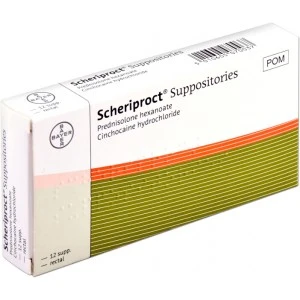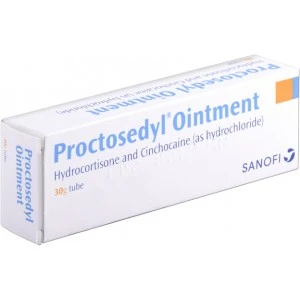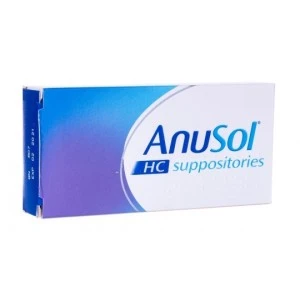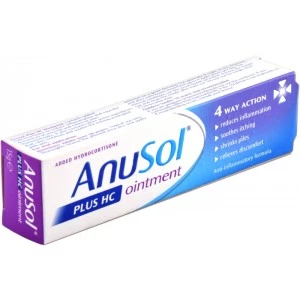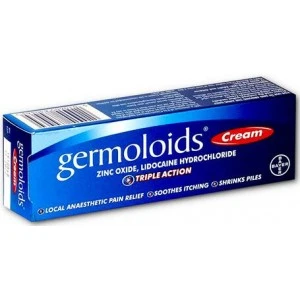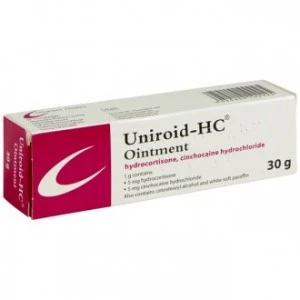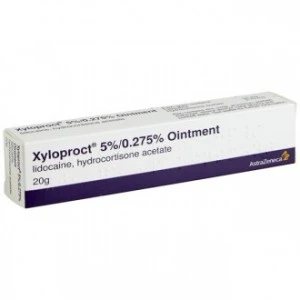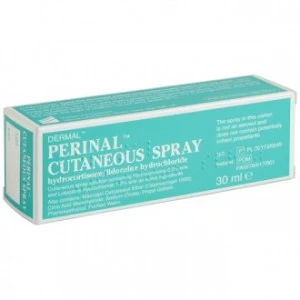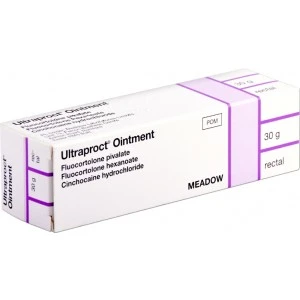Haemorrhoids
Haemorrhoids - also known as piles - are small swellings inside and around the anus. While they are usually asymptomatic, they can sometimes present as itchy, uncomfortable, or painful. For these cases, treatments can be sought to help reduce the inflammation and ease the discomfort or pain they may cause.
Scheriproct
- Relieves itching and discomfort
- Available as an ointment or suppository
- Dispensed from a UK-registered pharmacy
Proctosedyl Ointment & Suppositories
- Relieves itching and discomfort
- Treats internal and external piles
- Dispensed from UK-registered pharmacy
Anusol HC
- Treats internal and external piles
- Provides relief from itching and discomfort
- Dispatched from a UK-registered pharmacy
Anusol
- Treats internal and external haemorrhoids
- Available as an ointment or suppositories
- Dispensed from a UK-registered pharmacy
Germoloids
- Shrinks piles
- Reduces discomfort
- Available without a prescription
Uniroid-HC
- Relieves itching and discomfort
- Reduces inflammation
- Dispensed from a UK-registered pharmacy
Xyloproct
- Numbs affected area
- Reduces swelling of haemorrhoids
- Treats internal and external piles
Perinal Spray
- Relieves itching
- Reduces inflammation
- Easy to use spray
Proctofoam-HC
- Treats internal and external haemorrhoids
- Internal applicator provided
- Dispatched from a UK-registered pharmacy
Ultraproct
- Relieves itching and discomfort
- Available as an ointment or suppository
- Dispensed from a UK-registered pharmacy
What are Haemorrhoids?
Haemorrhoids, colloquially known as Piles, are a condition in which the veins inside the rectum become swollen. Increased pressure in the blood vessels surrounding the rectum is typically attributed to this condition.
Constipation and excessive straining during bowel movements are often considered common causes of Haemorrhoids. However, chronic diarrhoea can also increase your chances of piles.
Obesity, pregnancy heaving lifting, prolonged sitting and persistent coughing or vomiting can put pressure on the blood vessels around the anus, increasing your risk of piles.
If you are over 45 and/or have a family history of Haemorrhoids, you may be more susceptible to the condition.
What are the symptoms?
It is common for haemorrhoids to be asymptomatic (cause no symptoms) and go undetected. However, symptoms can occur.
Symptoms include:
- Blood when passing faeces
- Discomfort
- Distended lumps
- Itching
- Mucous discharge
- Pain
- Soreness
- Swelling around the anus
If your symptoms worsen, speak to your doctor.
Haemorrhoids may not be painful if they develop above the pectinate line. This is due to the presence of fewer nerves further inside the bowel.
How are Haemorrhoids diagnosed?
If this is the first time you are experiencing Haemorrhoids, it is recommended that you speak to your doctor. In many cases, your doctor will be able to make a diagnosis based on the visible symptoms. In other cases, your doctor may require an internal examination to make a diagnosis.
Diagnosis may require a proctoscope. A proctoscope is a small camera attached to a thin tube that is inserted into the rectum, allowing the doctor to examine the anal canal in greater detail.
Following a diagnosis, you may be able to treat your condition yourself.
In cases where the piles have developed above the pectinate line, surgery may be required.
How are they treated?
Depending on the severity of the case, several treatments may be offered.
For many, creams, ointments, and suppositories can be used to treat the condition.
More serious haemorrhoids may be treated with banding. This procedure involves cutting off the blood supply to the haemorrhoid using an elastic band. The band is tightened around the base of the haemorrhoid until the cells die and the haemorrhoid falls off.
A surgical procedure called a haemorrhoidectomy may be carried out under general anaesthesia.
Consult your GP to determine the most suitable treatment for you.
How can I prevent Haemorrhoids?
There are a few simple ways you can prevent haemorrhoids. Ensuring you eat a healthy and balanced diet, exercise regularly, and stay hydrated can all contribute to the prevention of haemorrhoids.
Getting enough fibrous food in your diet can reduce your chances of becoming constipated. Plant foods, such as fruits, vegetables, nuts, seeds, whole-grain bread and cereal, whole wheat, oats, and beans, are rich in fibre and help maintain a healthy colon.
Lowering your intake of caffeine and alcohol, and ensuring you consume enough water, will help keep your bowels functioning properly.
Delaying the need to defecate can result in constipation, which, in turn, can lead to haemorrhoids. Going to the toilet when you need to keep your digestive system moving.
Resources
Avoid these 7 foods if you have haemorrhoids
https://www.nhs.uk/conditions/piles-haemorrhoids/
© 2013 - 2026 Al Muhsineen Limited. All Rights Reserved. Registered Pharmacy: 34 Halliwell Road, Bolton BL1 8RL. Registered Office: 254 First Floor, Shearbrow, Blackburn, England, BB1 8DS

